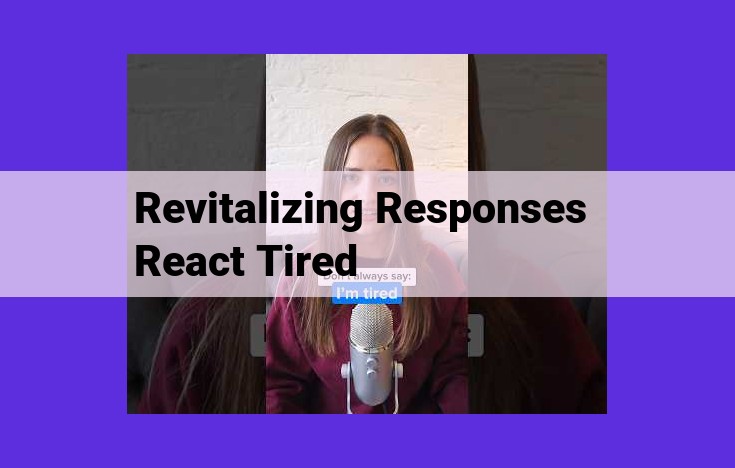- Recognize fatigue’s impact and understand CBT’s role in addressing negative thought patterns.
- Embrace exercise for its mood-boosting benefits and stress-reducing properties through mindfulness.
- Harness the power of mindfulness to stay present, manage emotions, and integrate nature exposure for holistic well-being.
Understanding Fatigue and Its Impact
Tiredness has become an epidemic in our modern world. From the relentless demands of work and family to the constant bombardment of digital distractions, we’re all feeling the strain. Fatigue is more than just feeling sleepy; it’s a persistent state of exhaustion that can drain us both physically and mentally.
The consequences of fatigue are far-reaching. It can impair our judgment, reduce our productivity, and make us more susceptible to accidents. In the long run, chronic fatigue can contribute to serious health problems, such as heart disease, stroke, and diabetes.
It’s clear that fatigue is a major problem, but what can we do about it? The good news is that there are a number of effective strategies to combat fatigue and improve our overall well-being.
Cognitive Behavioral Therapy (CBT)
- Explain the principles of CBT and how it helps identify and change negative thought patterns that contribute to stress.
- Highlight the benefits of CBT for stress management and emotional regulation.
Cognitive Behavioral Therapy (CBT): Breaking the Cycle of Stressful Thinking
If you often find yourself feeling stressed, overwhelmed, or anxious, you may be struggling with negative thought patterns that fuel these emotions. Cognitive Behavioral Therapy (CBT) is a powerful tool that can help you identify and change these unhelpful thoughts, leading to reduced stress and improved well-being.
CBT is based on the premise that our thoughts, feelings, and behaviors are interconnected. Negative thoughts can lead to negative emotions and harmful coping mechanisms, which in turn reinforce the cycle of stress. CBT aims to break this cycle by helping individuals:
-
Identify negative thoughts: Through techniques like journaling or thought records, CBT helps you become aware of the automatic thoughts that pop up in your head, especially when you’re feeling stressed.
-
Challenge distorted thinking: CBT teaches you to question the validity of your negative thoughts. Are they based on facts or biased perceptions? By challenging these distortions, you can gain a more balanced and realistic perspective.
-
Develop coping mechanisms: CBT provides practical strategies to manage negative thoughts and emotions. These may include relaxation techniques, problem-solving skills, or reframing negative events in a more positive light.
The benefits of CBT for stress management are numerous. Studies have shown that CBT can:
- Reduce anxiety and depression
- Improve mood and emotional regulation
- Increase resilience to stress
- Promote healthy coping mechanisms
- Enhance overall quality of life
If you’re struggling with stress and negative thinking, CBT can be a valuable tool for regaining control of your thoughts and emotions. Consider reaching out to a therapist who specializes in CBT to learn more about how this approach can help you break the cycle of stress and live a more fulfilling life.
The Power of Exercise: A Path to Stress Reduction
Exercise is not just about physical well-being; it’s a potent weapon against stress too. When you move your body, your brain rewards you with a surge of endorphins. These natural feel-good chemicals elevate your mood and reduce feelings of stress and anxiety.
But that’s not all. Exercise also helps strengthen your mind-body connection. When you engage in physical activity, you learn to focus on the present moment and let go of distracting thoughts. This mindfulness practice has proven to be incredibly effective in reducing stress levels.
Studies have shown that regular exercise can significantly lower levels of stress hormones like cortisol and increase the production of dopamine, a neurotransmitter linked to happiness and motivation. But it’s not just a fleeting effect; the benefits of exercise can accumulate over time, leading to lasting stress resilience.
Mindfulness: Training the Mind for Stress Management
In the fast-paced world we live in, stress has become an unavoidable part of our lives. It can manifest in various forms, from anxiety and fatigue to difficulty sleeping and impaired concentration. While stress is a normal human response, prolonged exposure to it can negatively impact our physical and mental well-being.
Introducing Mindfulness: A Path to Inner Peace
Amidst the hustle and bustle of daily life, mindfulness emerges as a beacon of tranquility. It is a practice that involves intentionally paying attention to the present moment, without judgment or distraction. By cultivating mindfulness, we train our minds to stay anchored in the here and now, allowing us to observe our thoughts and emotions with greater clarity and compassion.
The Power of Presence: Breaking Free from the Past and Future
When we practice mindfulness, we gently bring our awareness to our current experiences, whether it’s the sensation of our breath entering and leaving our bodies, the touch of our feet on the ground, or the sounds of nature surrounding us. By staying present, we free ourselves from the grip of the past (with its regrets and missed opportunities) and the anxiety about the future (with its uncertainties and fears).
Reducing Judgment: Embracing Emotions with Compassion
One of the key principles of mindfulness is non-judgment. This means observing our thoughts and emotions without labeling them as “good” or “bad.” When we practice non-judgment, we create a safe space for ourselves, where we can allow our emotions to flow through us without getting swept away by them. Instead of suppressing or avoiding difficult emotions, we learn to accept them with compassion and understanding.
Coping with Challenges: Mindfulness as a Shield
Mindfulness can be an invaluable tool for navigating life’s inevitable challenges. When faced with adversity, our minds often race with negative thoughts and worries. However, by training our attention, we can disengage from these unhelpful thought patterns and instead focus on the present moment. This allows us to respond to challenges with greater clarity, resilience, and equanimity.
Incorporating Mindfulness into Your Daily Life
Cultivating mindfulness does not require hours of meditation. Simple practices like taking a few deep breaths throughout the day, paying attention to the sensations of your body, or engaging in mindful activities like walking or eating can help you develop a more mindful mindset. Gradually, you will find that the principles of mindfulness start to permeate all aspects of your life, bringing greater calm, clarity, and resilience to your daily experiences.
Nature Exposure: A Natural Healer for Stress, Sleep, and Physical Well-being
Escape into the embrace of nature, a sanctuary that can soothe your weary soul and revitalize your mind and body. Studies have shown that immersing yourself in nature’s tranquility has profound benefits for reducing stress, improving sleep, and enhancing physical health.
Stress Reduction
Nature has an innate ability to calm our racing thoughts and ease anxiety. When we step into a natural setting, our senses are engaged by the sights, sounds, and scents of the environment. This sensory input activates the parasympathetic nervous system, which is responsible for relaxation and restoration. The tranquility of nature can help us disconnect from the demands of daily life and find moments of respite.
Improved Sleep
Sleep is essential for overall well-being, and nature exposure can play a significant role in improving the quality of your slumber. Exposure to natural sunlight during the day helps regulate the body’s circadian rhythm, making it easier to fall asleep at night. Additionally, spending time in nature before bed can help reduce stress and promote relaxation, creating a more conducive environment for restful sleep.
Enhanced Physical Health
Numerous studies have linked nature exposure to improved physical health outcomes. Exercise in natural settings, such as walking in a park or hiking in the mountains, has been shown to boost mood, reduce inflammation, and strengthen the immune system. Moreover, the fresh air and reduced pollution found in natural environments can improve respiratory health and overall well-being.
Integration with Exercise and Social Connection
Nature exposure can be seamlessly integrated with other stress-management strategies, such as exercise and social connection. Engage in mindful walking in a nearby park, where you can focus on the sights, sounds, and sensations of your surroundings. Connecting with friends or family in nature can foster camaraderie and provide a sense of community, further enhancing the stress-reducing benefits.
Incorporating nature exposure into your routine is a simple yet powerful way to reduce stress, improve sleep, and enhance your physical and mental well-being. Embrace the healing embrace of nature and discover the transformative power it holds for your overall health and happiness.
The Importance of Sleep: A Vital Pillar for Reducing Fatigue
Sleep, the elixir of life, plays a pivotal role in our physical and mental well-being. Its restorative power extends far beyond mere rest and relaxation. Adequate sleep is essential for **reducing fatigue and maintaining optimal cognitive function.**
Why is Sleep Important?
During sleep, our bodies undergo a myriad of regenerative processes. Hormones are released to repair cells, muscles rebuild, and memories are consolidated. When we’re well-rested, we awake feeling refreshed, alert, and ready to tackle the day. Conversely, chronic sleep deprivation can lead to fatigue, irritability, impaired judgment, and even an increased risk of accidents and health problems.
Sleep and Fatigue Reduction
Quality sleep is a crucial aspect of fatigue management. When we’re sleep-deprived, our energy levels plummet, leaving us feeling sluggish and exhausted. By prioritizing sleep, we give our bodies the time and resources they need to repair and restore themselves, reducing fatigue and improving our overall sense of well-being.
Cognitive Benefits of Sleep
Sleep also plays a vital role in our cognitive function. During deep sleep, our brains consolidate memories, enhancing our ability to learn and recall information. Adequate sleep also improves our attention span, problem-solving skills, and decision-making abilities.
Integrating Sleep into a Holistic Approach
To reap the benefits of sleep for fatigue reduction, consider incorporating the following strategies:
- Cognitive Behavioral Therapy (CBT): CBT can help you identify and change negative thought patterns that interfere with sleep.
- Exercise: Regular physical activity promotes relaxation and improves sleep quality.
- Mindfulness: Mindfulness techniques can help calm the mind and prepare the body for sleep.
- Stress Management: Managing stress levels can help reduce sleep disturbances.
Sleep is not a luxury but a necessity for a healthier, more vibrant life. By prioritizing sleep and implementing strategies to improve its quality, we can reduce fatigue, enhance cognitive function, and promote overall well-being. Embrace the transformative power of sleep and awaken to a life filled with energy, resilience, and vitality.
Social Connection: A Vital Lifeline for Stress Management
Maintaining strong social connections is paramount for our well-being. Research has consistently shown that having a supportive network of friends, family, and community members can significantly reduce stress, elevate mood, and promote restful sleep.
Social support provides a sense of belonging and security, reducing feelings of isolation and loneliness. When we feel connected to others, we are more likely to confide in them about our challenges, seek advice, and offer support in return. This reciprocal exchange fosters emotional resilience and provides a safe haven during times of stress.
Moreover, social interactions promote a release of oxytocin, a hormone associated with bonding and relaxation. This neurochemical helps us feel calm, trusting, and content, which can counteract the negative effects of stress on our mind and body.
Incorporating social connection into our stress management strategies can be done through various activities. Nature exposure, for instance, offers a perfect opportunity to connect with others and engage with the natural world simultaneously. Walking, hiking, or simply spending time in a park with a friend can not only reduce stress levels but also enhance social bonding.
Additionally, stress management techniques such as yoga, meditation, or mindfulness can be practiced in group settings. These activities provide a shared space for individuals to connect, support one another, and cultivate a sense of community. By engaging in these practices together, we create a positive feedback loop that amplifies their stress-reducing benefits.
Fostering strong social connections is a vital aspect of a comprehensive stress management plan. Whether it’s through spending time in nature, participating in group activities, or simply reaching out to loved ones, social support provides a powerful buffer against the negative effects of stress and promotes overall well-being. By prioritizing our relationships and making an effort to connect with others, we can mitigate fatigue, respond effectively to challenges, and cultivate a healthier, happier life.
Holistic Stress Management: A Comprehensive Approach to Restoring Inner Balance
Fatigue and stress can weigh heavily on our minds and bodies, leaving us feeling drained and overwhelmed. To effectively address these challenges, a holistic approach that encompasses multiple strategies is crucial. This comprehensive plan integrates Cognitive Behavioral Therapy (CBT), exercise, mindfulness, quality sleep, and social connection to provide a solid foundation for managing stress and revitalizing well-being.
Cognitive Behavioral Therapy:
CBT empowers individuals with the tools to identify and challenge negative thought patterns that contribute to stress. By examining the connection between thoughts, feelings, and behaviors, CBT helps develop healthier coping mechanisms, reduce emotional reactivity, and promote a more positive outlook on life.
Exercise: The Body’s Natural Remedy
Physical activity offers numerous physiological benefits that combat fatigue and enhance mood. Exercise releases endorphins, which have mood-boosting effects. It also improves cardiovascular health, reducing the physical and mental strain caused by stress.
Mindfulness: Cultivating Inner Peace
Mindfulness practices train the mind to stay present, reducing judgment and fostering a greater awareness of emotions. By focusing on the present moment, individuals can learn to respond to stressors with calmness and clarity, rather than reacting impulsively.
Sleep: Restoring Mind and Body
Quality sleep is essential for both physical and cognitive function. When we are sleep-deprived, our ability to manage stress is compromised. By incorporating CBT, exercise, mindfulness, and stress management techniques into daily routines, individuals can improve sleep patterns and enhance overall well-being.
Social Connection: A Vital Lifeline
Human connection provides significant support in times of stress. Sharing experiences, seeking advice, and engaging in social activities can reduce loneliness, improve mood, and strengthen resilience. Nature exposure, such as spending time in parks or forests, has also been shown to promote relaxation and enhance mental well-being.
The Synergy of Holistic Stress Management
When these strategies are combined, they create a powerful synergy that supports healthy coping mechanisms when feeling tired. CBT helps identify and change negative thought patterns, while exercise releases tension and improves mood. Mindfulness cultivates inner peace, reducing stress reactivity. Quality sleep replenishes energy and cognitive function. Finally, social connection provides a sense of belonging and support.
By embracing a holistic approach to stress management, individuals can effectively combat fatigue, promote emotional regulation, and restore inner balance. These practices empower us to respond to stressors with resilience, enhance our overall health and happiness, and lead more fulfilling lives.




